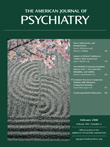Dr. Payne Replies
To The Editor: I greatly appreciate the thoughtful comments expressed by Ms. Burbeck, Mr. Pilling, and Drs. Tomson and McDonald. I completely agree that babies exposed to antidepressants during pregnancy should be monitored for symptoms of withdrawal and serotonergic toxicity and psychological treatments are appropriate during both pregnancy and the postpartum period. The space limitations of my article did not allow for a fuller discussion of such treatments, but I would like to note the recent publication of another Cochran review, which specifically investigated psychological treatments for postpartum depression (1) . Unlike the review of psychological treatments for the prevention of postpartum depression (2) discussed in my article, this review found supportive evidence for the use of psychological interventions, including cognitive behavioral therapy and interpersonal psychotherapy, in the treatment of postpartum depression. The review also emphasized the lack of methodologically strong research in this area and the need for further trials. Finally, although I agree that the use of paroxetine during pregnancy is limited by concerns over its safety as well as the difficulties many experience during withdrawal, I would like to re-emphasize the point that each case—when treating women who are or will be pregnant or breast-feeding—should be considered individually. The risks and benefits of any drug used during pregnancy or breast-feeding will need to be weighed against the risks and benefits of no treatment. There may in fact be cases in which the benefits of using paroxetine will outweigh the risks for a particular individual.
1. Dennis CL, Hodnett E: Psychosocial and psychological interventions for treating postpartum depression. Cochrane Database Syst Rev 2007; 4:CD006116Google Scholar
2. Dennis CL, Creedy D: Psychosocial and psychological interventions for preventing postpartum depression. Cochrane Database Syst Rev 2004; 4:CD001134Google Scholar



